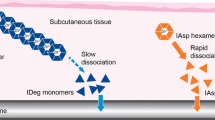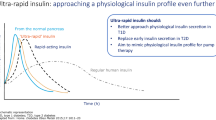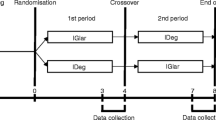Abstract
The effect on postprandial blood glucose control of an immediately pre-meal injection of the rapid acting insulin analogue Aspart (IAsp) was compared with that of human insulin Actrapid injected immediately or 30 before a test meal in insulin-treated type 2 diabetic patients with residual β-cell function. In a double-blind, double dummy crossover design, patients attended three study days where the following insulin injections in combination with placebo were given in a random order: IAsp (0.15 IU/kg body weight) immediately before the meal, or insulin Actrapid (0.15 IU/kg) immediately (Act-0) or 30 minutes before (Act-30) a test meal. We studied 25 insulin-requiring type 2 diabetic patients, including 14 males and 11 females, with a mean age of 59.7 years (range, 43–71), body mass index 28.3 kg/m2 (range, 21.9–35.0), HbA1c 8.5% (range, 6.8–10.0), glucagon-stimulated C-peptide 1.0 nmol/l (range, 0.3–2.5) and diabetes duration 12.5 years (range, 3.0–26.0). Twenty-two patients completed the study A significantly improved postprandial glucose control was demonstrated with IAsp as compared to Act0, based on a significantly smaller postprandial blood glucose excursion (IAsp, 899 ± 609 (SD) mmol/l · min versus Act0, 1102 ± 497 mmol/l min, p < 0.01) and supported by a significantly lower maximum serum glucose concentration (Cmax) up to 360 min after dosing (IAsp, 10.8 ± 2.2 mmol/l vs. Act0, 12.0 ±2.4 mmol/l, p < 0.02). No difference was demonstrated with a meal and Actrapid injected 30 minutes before the meal (AUCglucose IAsp, 899 ± 609 mmol/l min vs. Act-30, 868 ± 374 mmol/l min; Cmax IAsp, 10.8 ± 2.2 mmol/l vs. Act-30, 11.1 ± 1.8 mmol/l).
No concerns about the safety of IAsp were raised. Immediate pre-meal administration of the rapid-acting insulin analogue Aspart in patients with type 2 diabetes resulted in an improved postprandial glucose control compared to Actrapid injected immediately before the meal, but showed similar control compared to Actrapid injected 30 minutes before the meal. These results indicate that the improved glucose control previously demonstrated with insulin Aspart compared to human insulin in healthy subjects and type 1 diabetic patients also applies to insulin-treated type 2 diabetic patients.
Similar content being viewed by others
Author information
Authors and Affiliations
Additional information
Received: 3 December 1999 / Accepted in revised form: 3 March 2000
Rights and permissions
About this article
Cite this article
Rosenfalck, A., Thorsby, P., Kjems, L. et al. Improved postprandial glycaemic controls with insulin Aspart in type 2 diabetic patients treated with insulin. Acta Diabetol 37, 41–46 (2000). https://doi.org/10.1007/s005920070034
Issue Date:
DOI: https://doi.org/10.1007/s005920070034




